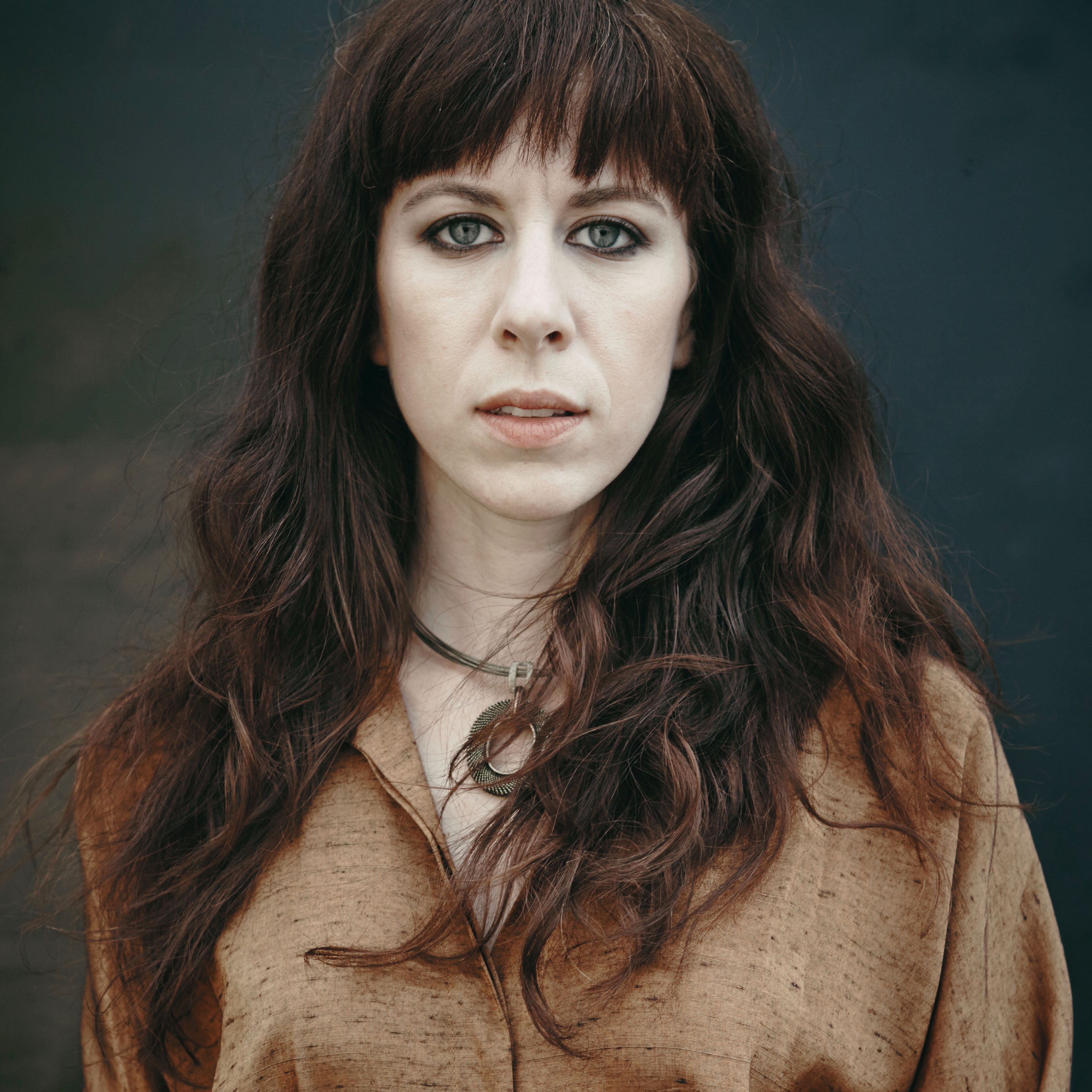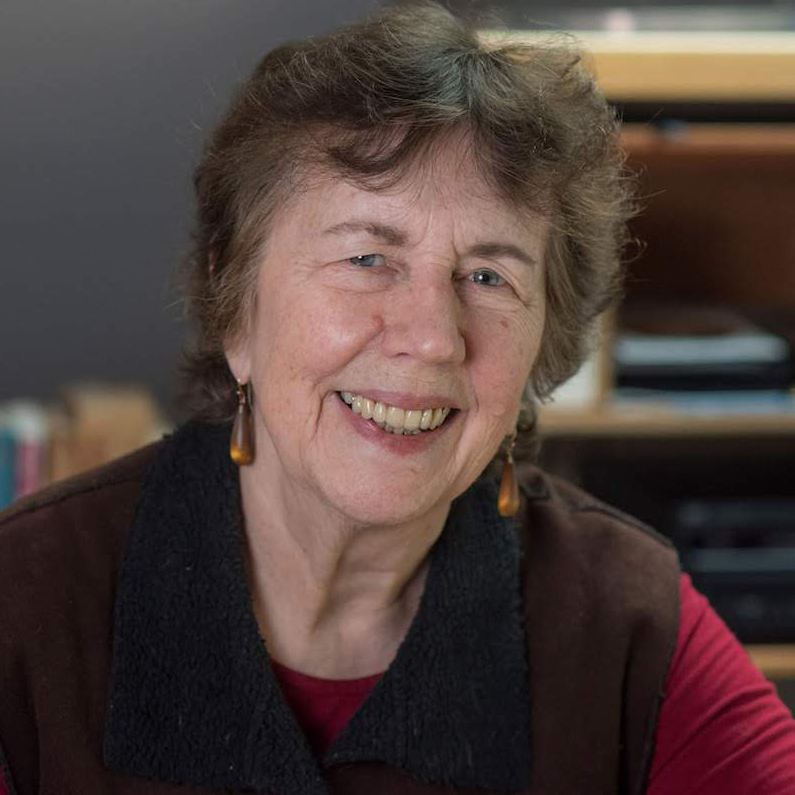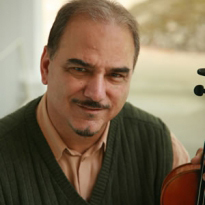Composition students partake in the Common Curriculum, shared by all students in the Undergraduate Double Degree Program, while also participating in additional courses designed to enhance their compositional toolbox, including writing for the voice, film scoring and orchestration, and electronic music. The small size of the entirely undergraduate composition program ensures that all students have unparalleled access to Bard's outstanding faculty and are provided ample opportunities to hear their works performed.
Faculty
Composition students receive weekly private lessons with Missy Mazzoli, Joan Tower, and George Tsontakis. Additional composition faculty include Sarah Hennies and Matthew Sargent, specializing in Electronic Music, and Mark Baechle and James Sizemore, specializing in film scoring. Jessie Montgomery also works with students in yearly master class settings.
-
 Missy Mazzoli
Missy MazzoliMissy Mazzoli

Recently deemed “one of the more consistently inventive, surprising composers now working in New York” (NY Times), “Brooklyn’s post-millennial Mozart” (Time Out NY), and praised for her “apocalyptic imagination” (Alex Ross, The New Yorker), Missy Mazzoli has had her music performed by the Kronos Quartet, LA Opera, eighth blackbird, the BBC Symphony, the Minnesota Orchestra, Scottish Opera and many others. In 2018 she became, along with Jeanine Tesori, the first woman to receive a main stage commission from the Metropolitan Opera, and was nominated for a Grammy award in the category of “Best Classical Composition". From 2018-2021 she was Mead Composer-in-Residence at the Chicago Symphony Orchestra, and from 2012-2015 was Composer-in-Residence with Opera Philadelphia. Her 2018 opera Proving Up, created with longtime collaborator librettist Royce Vavrek and based on a short story by Karen Russell, is a surreal commentary on the American dream. It was commissioned and premiered by Washington National Opera, Opera Omaha and Miller Theatre, and was deemed “harrowing… a true opera for its time” by the Washington Post. Her 2016 opera Breaking the Waves, commissioned by Opera Philadelphia and Beth Morrison Projects, was called “one of the best 21st-century American operas yet” by Opera News. Breaking the Waves received its European premiere at the 2019 Edinburgh Festival; future performances are planned at LA Opera, Houston Grand Opera, and the Adelaide Festival. Her next opera, The Listeners, will premiere in 2022 at the Norwegian National Opera, Chicago Lyric Opera and Opera Philadelphia. Missy is also active in the orchestral and chamber music field, recently writing new works for the National Symphony, Cincinnati Symphony, BBC Philharmonia, and the Bergen Symphony, among others. In 2016, Missy and composer Ellen Reid founded Luna Lab, a mentorship program for young female, non-binary and gender nonconforming composers created in partnership with the Kaufman Music Center. Her works are published by G. Schirmer. missymazzoli.com
Photo by Marylene May -
 Joan Tower
Joan TowerJoan Tower

Joan Tower is widely regarded as one of the most important American composers living today. During a career spanning more than 50 years, she has made lasting contributions to musical life in the United States as composer, performer, conductor, and educator. Her works have been commissioned by major ensembles, soloists, and orchestras, including the Emerson, Tokyo, and Muir quartets; soloists Evelyn Glennie, Carol Wincenc, David Shifrin, and John Browning; and the orchestras of Chicago, New York, St. Louis, Pittsburgh, and Washington, D.C., among others.
In 1990, Tower became the first woman to win the prestigious Grawemeyer Award for her composition Silver Ladders. She was the first composer chosen for a Ford Made in America consortium commission of 65 orchestras. The Nashville Symphony and conductor Leonard Slatkin recorded that work, Made in America, with Tambor and Concerto for Orchestra for the Naxos label. The top-selling recording won three 2008 Grammy awards: Best Classical Contemporary Composition, Best Classical Album, and Best Orchestral Performance.
From 1969 to 1984, she was pianist and founding member of the Naumburg Award-winning Da Capo Chamber Players, which commissioned and premiered many of her most popular works. Her first orchestral work, Sequoia, quickly entered the repertory. Tower's tremendously popular five Fanfares for the Uncommon Woman have been played by over 500 different ensembles. She is currently Asher Edelman Professor of Music at Bard College, where she has taught since 1972.
Her composer-residencies with orchestras and festivals include a decade with the Orchestra of St. Luke's, the Pittsburgh Symphony Orchestra’s Composer of the Year for their 2010-2011 season, as well as the St. Louis Symphony, the Deer Valley Music Festival, and the Yale/Norfolk Chamber Music Festival.
Among her recent premieres: White Water (2012), commissioned by Chamber Music Monterey Bay and premiered by the Daedalus Quartet; Stroke (2011), commissioned by the Pittsburgh Symphony Orchestra; White Granite (2009), commissioned by St. Timothy's Summer Music Festival, Bravo! Vail Valley Music Festival, and La Jolla Music Society for SummerFest; Angels(2008), her fourth string quartet, commissioned by Music for Angel Fire and premiered by the Miami String Quartet; Dumbarton Quintet (2008), a piano quintet commissioned by the Dumbarton Oaks Estate (their third commission after Stravinsky and Copland) and premiered by Tower and the Enso String Quartet; Chamber Dance (2006), commissioned, premiered, and toured by Orpheus; and Copperwave (2006), written for the American Brass Quintet and commissioned by The Juilliard School of Music. A Gift (2007), for winds and piano, was commissioned by Chamber Music Northwest and premiered by The Chamber Music Society of Lincoln Center (CMS). Other CMS premieres included Trio Cavany (2007) and Simply Purple (2008) for viola, performed by Paul Neubauer.
Her compositions cross many genres: Can I (2007) for youth chorus and percussionist; Copperwave (2006), written for brass quintet; DNA (2003), a percussion quintet commissioned for Frank Epstein and the New England Conservatory Percussion Ensemble; Fascinating Ribbons (2001), her foray into the world of band music, premiered at the annual conference of College Band Directors; Vast Antique Cubes/Throbbing Still (2000), a solo piano piece for John Browning; Tambor (1998), for the Pittsburgh Symphony under the baton of Mariss Jansons; and her ballet Stepping Stones (1993), commissioned by choreographer Kathryn Posin for the Milwaukee Ballet and revisited by Posin with the Bulgarian Ballet in June 2011.
Joan Tower's music is published by Associated Music Publishers.
Photo by Cynthia Del Conte. -
 George Tsontakis
George TsontakisGeorge Tsontakis

George Tsontakis has been the recipient of the two richest prizes awarded in all of classical music; the international Grawemeyer Award, in 2005, for his Second Violin Concerto and the 2007 Ives Living, awarded every three years by the American Academy of Arts and Letters. He studied with Roger Sessions at Juilliard and, in Rome, with Franco Donatoni. Born in Astoria, New York, into a strongly Cretan heritage, he has, in recent years, become an important figure in the music of Greece, and his music is increasingly performed abroad, with dozens of performances in Europe every season. Most of his music, including eleven major orchestral works and four concertos have been recorded by Hyperion and Koch, leading to two Grammy Nominations for Best Classical Composition, in 2009 and 1999. He is Distinguished Composer in Residence at Bard and artist-faculty emeritus with the Aspen Music Festival, where he was founding director of the Aspen Contemporary Ensemble from 1991 to 1999. He served three years as composer in residence with the Oxford (England) Philomusica; was the featured composer in residence with the Chamber Music Society of Lincoln Center for the 2008-09 season; and is continuing a six-year Music Alive residency with the Albany Symphony. He lives in New York State’s Catskill Mountains, in Shokan.
Performing for Composers
Integral to every composer's growth is the opportunity to hear their works performed by real, live musicians. Composition majors at Bard are offered extensive opportunities to have their works performed by the Da Capo Chamber Players, the Bard Conservatory Orchestra, and the American Symphony Orchestra. Special performances by fellow students are part of the contemporary music series Music Alive!, curated by Joan Tower. Additionally, chamber music ensembles are encouraged to form special relationships with peer composers in Bard Conservatory. This is mutually beneficial for the composer and ensemble because by hearing the work of the ensemble, the composers are able to write works especially suited to the strengths of the ensemble. In the preparation for performances of new works, ensembles have the opportunity to gain a rich understanding of composers’ musical ideas.
Composition Concentrations
-
Conducting Concentration for Performance & Composition MajorsThis track within the Conservatory Undergraduate Double Degree Program offers students training in conducting, in conjunction with their composition or performance degree.
Students in this track take beginning and intermediate conducting with maestro James Bagwell, co-director of the Graduate Conducting program. After completion of these courses students enroll in the graduate conducting seminar which meets in weekly sessions with two pianos or with a small orchestral ensemble. Additionally, students are required to complete three courses from the following list.Conducting Concentration for Performance & Composition Majors
This track within the Conservatory Undergraduate Double Degree Program offers students training in conducting, in conjunction with their composition or performance degree.
Students in this track take beginning and intermediate conducting with maestro James Bagwell, co-director of the Graduate Conducting program. After completion of these courses students enroll in the graduate conducting seminar which meets in weekly sessions with two pianos or with a small orchestral ensemble. Additionally, students are required to complete three courses from the following list.
Students are required to complete at least three of the courses from the following list.- Ear Training and Score Reading for Conductors
- Keyboard Skills
- Secondary Lessons in another orchestral instrument or in voice
- Foreign Language Study (offered through Bard College language programs)
- Diction (Italian, French, German, English)
-
Film Scoring Concentration for Composition MajorsIn collaboration with the Bard College Music Program and Film and Electronic Arts Program, this specialized track within the Conservatory Undergraduate Double Degree Program offers students a concentration in film scoring.
In addition to the traditional classical composition curriculum, students pursuing this concentration also participate in a two semester Film Scoring Workshop, led by Mark Baechle and James Sizemore, private lessons in film scoring, and at least two elective courses offered through the Bard Music Program or Film and Electronic Arts Program.Film Scoring Concentration for Composition Majors
In collaboration with the Bard College Music Program and Film and Electronic Arts Program, this specialized track within the Conservatory Undergraduate Double Degree Program offers students a concentration in film scoring.
In addition to the traditional classical composition curriculum, students pursuing this concentration also participate in a two semester Film Scoring Workshop, led by Mark Baechle and James Sizemore, private lessons in film scoring, and at least two elective courses offered through the Bard Music Program or Film and Electronic Arts Program.
- CNSV 201 Composing for Film: Aesthetics & Techniques (2 semesters)
- Private lessons with a film scoring instructor
- At least two elective courses from the list below:
- MUS 204 Form and Structure in Movie Musicals
- MUS 215 Introduction to Conducting
- MUS 256 Orchestration Class
- MUS 257 Production and Reproduction
- MUS 262 Topics in Music Software: Introduction to MAX/MSP
- MUS 315 Interaction: Music & Film
- MUS 364 Composition Techniques for Musicians and Orchestrations Toolkit
- FILM 265 Music Video
- FILM 369 Sound in Film and Electronic Arts
Additional Composition Electives
-
Follow the Lieder: Writing for the Voice in the 21st Century
Taught by Missy Mazzoli, this course is a study of art songs, arias, and their contemporary descendants, with a special focus on the composition of original vocal works. Includes a study of the physicality of vocal production as well as analysis of works by Schubert, Mahler, Britten, Meredith Monk and Mariah Carey, among others. Students will complete small creative assignments throughout the semester and work one-on-one with both graduate and undergraduate singers on original compositions. The course will culminate in a recorded public performance of new student works for voice and piano.Composing for Film: Aesthetics & Techniques
Taught by James Sizemore and Mark Baechle, this course will explore the aesthetics and practice of film music composition. Common uses of film music will be understood through the analysis of pivotal film scores. Techniques for writing and producing film music will be demonstrated using behind the scenes, real world examples from Oscar winning Indies and Hollywood Blockbusters. In addition to gaining an understanding of the design of popular film scores, students will learn practical techniques and methods for creating music productions through demonstrations using software applications and computer workstations. The course will feature guest lectures from some of the leading figures in film music composition, including Conservatory dean and film composer Tan Dun.20th Century Compositional Technique
Taught by George Tsontakis, this is a course in composing based on historical models. The first decade of the 20th century saw an explosion of innovative compositional theories and directions. Led by Debussy and pre-serial Schoenberg, composers began to reshape the future of music. Harmonic symmetries commingled with traditional diatonic and chromatic practices brought new colors, textures, form and freedom, leading to the wide array of musical styles and aesthetics heard today. A course in listening and analysis of selected seminal works, from Debussy to Messiaen and Ligeti, in their historical context. Written analysis of works covered; students will present to the class on selected pieces; some imitative theoretical composition similar to what is expected in traditional harmony classes.Introduction to Electronic Music
Taught by Matthew Sargent, this hands-on course will serve as an introduction to music technology and will focus on the creation of original work, including a final project, through the use of digital and analog tools and processes. Students will be introduced to foundational practices in electro-acoustic sound production and their contemporary/digital analogues, with particular emphasis on signal processing, studio and field recording, and modes of diffusion, including multichannel installation and live performance, and instruction in digital audio workstation software (Logic Pro, Pro Tools, and others). Examples from the history of electronic music will assist students in exploring contemporary approaches to electronic music software and technology. Enrollment in the course automatically gives students access to the Bard electronic music studios.Electroacoustic Composition Seminar
Taught by Sarah Hennies, this course is focused on the individual creative work of the students enrolled. The course will serve as a workshop environment for student work: participants will be expected to regularly present and discuss their ongoing compositional projects. These will be examined by the instructor and other class members. Students may also take on collaborative works, installations, and intermedia projects. Analyses and class presentations of contemporary electroacoustic repertoire will also be expected of the students during the semesterThe Recording Studio as a Compositional Tool
Taught by Matthew Sargent, this course will focus on working creatively as a composer within the recording studio environment. Topics will include multi-tracking, acoustics, microphone placement, audio mixing, musical notation (from traditional scoring methods to uses of text scores, open scores, and improvisation), digital and analog signal processing, synchronization of audio with video/media, and blending of musical material from MIDI and audio sources. All genres of music are welcome. Students will write new compositions, centered around specific studio practices, and take part in regular critique sessions of their work at draft stages. Grading will be assessed based on a submitted portfolio of recorded material completed during the semester.Topics in Music Software: Introduction to Max/Msp
Taught by Matthew Sargent, this course will introduce students to Max/Msp, an object-oriented programming environment for real-time audio processing, digital synthesis, algorithmic composition, data sonification, and more. Students will learn fundamental concepts of digital audio and computer programming while engaging in creative projects and in-class performances. The class will include examples of Max patches found in major works of 20/21st century electroacoustic music and sound art repertoire. The course will also explore connectivity between Max and other software applications, including Max4Live. The course will conclude with a final project.
Algorithmic Composition and Improvisation
Taught by Matthew Sargent, in this seminar, our computers will act as composers, improvisers, orchestrators, and accompanists. Students will explore a variety of conceptual strategies for the real-time computer generation of musical events, while learning fundamentals of object-oriented programming. Students will engage in discussion of artificial intelligence and musical creativity, through the investigation of pioneering algorithmic works from the 20/21st century, including the music of Lejaren Hiller, Iannis Xenakis, George Lewis, David Cope, Laurie Spiegel, Tristan Perich, and Holly Herndon. This course will conclude with a final project and class performance.


